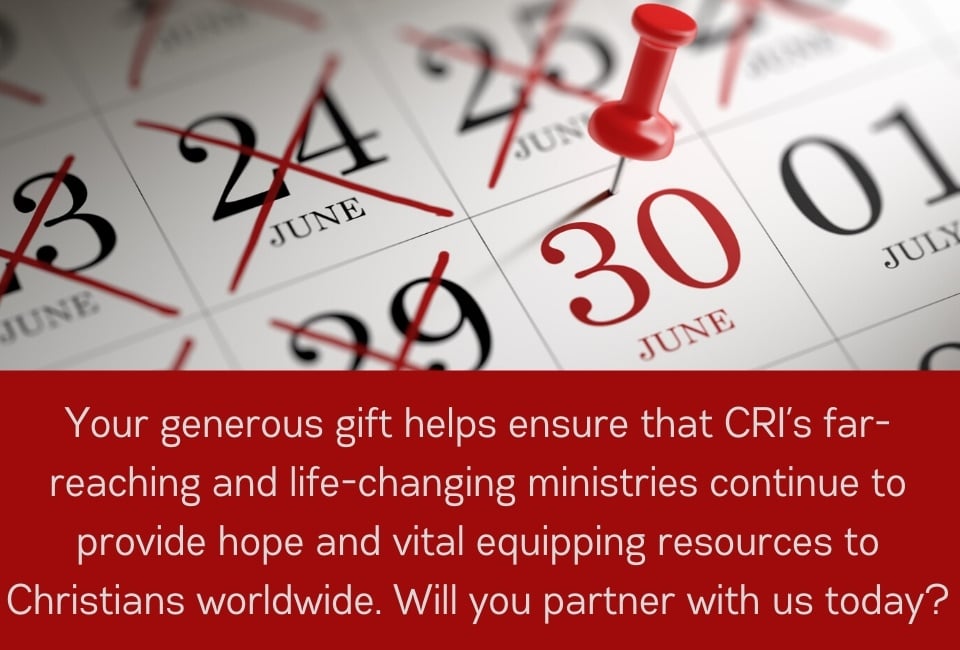This article first appeared in the Christian Research Journal, volume 39, number 05 (2016).
For further information or to support the Christian Research Journal please click here.
When you support the Journal, you join the team and help provide the resources at equip.org that minister to people worldwide. These resources include our ever-growing database of over 2,000 articles, as well as our free Postmodern Realities podcast.
Another way you can support our online articles is by leaving us a tip. A tip is just a small amount, like $3, $5, or $10, which is the cost of a latte, lunch out, or coffee drink. To leave a tip, click here
You’re downtown walking the streets with your friends, laughing and having a good time, and then you hear it. Your ears strain to take in the faint sound of what seems to be someone screaming. As you get closer, you see a bullhorn pressed to the preacher’s lips in one hand and a beat-up Bible in the other. His voice is at full volume now, people around look uncomfortable, and you think, “Here we go again with another legalistic street preacher. What am I going to hell for this time?”
When I first became a Christian, I was the one rolling my eyes and expressing how those “crazy street preachers give Christians a bad rap.” Yet ten years later, and after a good gut-wrenching turn through the humility press, I am now one of those annoying “legalists.” I can tell you, I’ve been to hell and back (metaphorically) in my experiences of sharing the gospel with strangers on the streets, but it’s a great slice of heaven I get to experience in this life.
Training Grounds. My husband, Steve, and I met in Texas at a ministry that trained us in evangelism.1 The training involved listening to a few lectures before we were dropped off at the local outdoor swap mart, loaded with gospel tracts, and told to engage people in conversation. This was one of my first tastes of sharing the gospel with strangers. I got mostly weird looks, but at the end of the day, one guy high-fived me and thanked me for talking to him.
Six months later, Steve and I were married and living in his homeland of New Zealand. One Friday night soon after we moved there, we went out to explore the streets of Auckland — the country’s biggest city. We stopped at a Korean prayer station where a man came up and asked if he could pray for us. Afterward, with a big smile on his face, he told us he believed Steve was going to be a preacher. We weren’t sure about that, but it got the wheels spinning in our brains that we need to be out sharing the gospel. So Friday evenings became evangelism night in downtown Auckland.
Fear of Man. Being submerged in an atheistic, pluralistic culture with people from all over the world was definitely a fun training playground. As we took the fearful yet thrilling plunge into street evangelism on our first night out with gospel tracts in hand, little did we know what awaited us the rest of our years in Auckland. From encounters with the homeless, drug addicts, drunks, philosophers, professors, and any religion/cult you could think of, there was never a dull moment. We had our share of being threatened, slapped, targeted with liquid or flammable substances, and called every imaginable name — the most unique was “deconstructionists” by Hare Krishnas. But Steve orchestrated the scariest situation.
Muslims from all over came to New Zealand to learn English, and oftentimes we were the first Christians with whom they had a chance to speak. They typically don’t go to clubs or bars, so the coffee shop we stood in front of every week was a popular hangout for them. One night, Steve came up to me and said, “If I start getting beat up, call the cops.” Next thing I knew, he walked into the middle of a huge group of Muslims and said, “Does anyone here know Muhammad?” We ended up inside the coffee shop with an imam (Muslim religious leader) and two of his friends. After buying us a drink of our choice, the five-hour conversation began. They told us about Islam, and in exchange we shared about Christianity and the one, true God of the Bible. When the shop closed, they invited us to their apartment nearby where we talked for three more hours. In the end, their conclusion was that we should kill ourselves. Since there was nothing we could do to merit God’s grace in saving us, what was the point of life if we couldn’t earn His favor, especially as a Christian?
Another time, after seeing a play downtown, Steve got in a conversation with a guy who invited him to speak to his church’s youth group. A few weeks later, we met him at someone’s house. After thirty minutes of pleasantries, we noticed no youth had shown up. Instead, our hosts popped in a video and encouraged us to convert to Seventh-day Adventism. After the shock of being deceived wore off, we went back two more times to engage them in Bible study concerning where the scriptural errors of this group lie.
Unexpected Fruit. Through these experiences, we grew in Christ like we never thought possible. For the most part, people rejected the gospel to our face, no matter how much we pleaded with them to repent and trust Christ. Results became understood to mean not that the whole city would fall on its knees but rather through the preaching of His Word, God would soften hardened hearts for His glory. So our job was to be messengers, and He would take care of how that panned out in each individual.
Then came the preaching. Neither one of us was keen on it; in fact, we were perfectly content handing out tracts and getting in conversations with people. However, Steve suddenly found himself in the middle of it. Someone walked by and said something snarky, and then left instead of staying and defending his views. In response, Steve hopped on a bench and loudly shared the gospel with the man as he walked away. Since Steve had bolted through the door into open-air preaching and was now comfortable with the idea, we guessed this meant we had better get an amp with a mic and set up a second mic to give people a chance to engage with us.
Engage they did! If you’ve never seen atheists eagerly fight over a mic to try and stump the preacher, you haven’t been fully entertained. We loved that they loved to engage — at least they cared enough about God to stop and talk about Him.
One night a guy who shared that he was homosexual went up to the mic and tried as hard as he could to brand Steve with the “God hates fags” characterization. Try as he might, he couldn’t. The final straw was when a guy we were friends with came up to Steve in the middle of that conversation and gave him a big hug to say hi. Steve had shared the gospel with him many times before. So he mentioned to the angry guy on the mic that he was a homosexual, and Steve indeed did not hate him. The other guy knew it was over and stormed off.
I can go on about how we met a group of Americans who came to New Zealand to evangelize during the Rugby World Cup. The Lord used them to get us to a seminary in South Carolina, and eventually out at the local abortion clinic here in Greenville, but that’s another story. Hey, maybe that Korean guy at the prayer station was right about Steve becoming a preacher.
Go and Tell. Yes, the stories we have are crazy, and our experiences have brought me from tears of frustration and sadness to shouts of joy. But as for you, reader, and for every other Christian, the message is from Christ: “Go into all the world and proclaim the gospel to the whole creation” (Mark 16:15 ESV). Go into the highways and byways, and seek out the unbelievers. Don’t wait for them to come to you, see how moral you are, and ask why. After all, can’t the atheist seem just as moral on the outside? By all means live righteously, but the difference comes in sharing the gospel with them using words.
Whether it’s at your workplace, among family and friends, or on the streets, go and tell. It will be one of the hardest endeavours to take up in obedience, as the world, the Devil, and the flesh fight hard to keep you from doing it. Why? It’s the sharing and preaching of God’s Word that He uses to save sinners through the work of the Holy Spirit.
But won’t God call every one of His sheep to Himself whether I obey Him or not? I’ll meet that with a resounding “yeah/nah,” which is famous in New Zealand. “Yeah” in that God doesn’t need my help in this work, but “nah” in the sense that He commands me and every other Christian to “honor Christ the Lord as holy, always being prepared to make a defense to anyone who asks you for a reason for the hope that is in you; yet do it with gentleness and respect, having a good conscience, so that, when you are slandered, those who revile your good behavior in Christ may be put to shame” (1 Pet. 3:15–16).
And finally to remember, “If the world hates you, know that it has hated me before it hated you. If you were of the world, the world would love you as its own; but because you are not of the world, but I chose you out of the world, therefore the world hates you” (John 15:18–19, ESV). — Laura Cliff
Laura Cliff studies apologetics with her evangelism buddy/husband at Greenville Presbyterian Theological Seminary. Underneath it all, she is grateful to be a sinner saved by God’s grace.
- Minister Ray Comfort’s style of evangelism.










